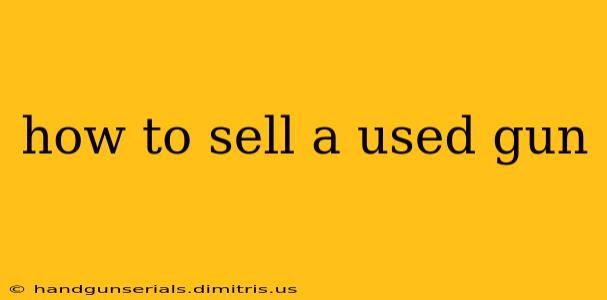Selling a used firearm requires careful navigation of legal regulations and safety protocols. This guide outlines the crucial steps to ensure a smooth and compliant transaction, protecting both you and the buyer. Remember, laws vary significantly by state and even locality, so always verify your local regulations before proceeding. This information is for guidance only and does not constitute legal advice. Consult with legal counsel for definitive answers regarding your specific situation.
Understanding the Legal Landscape
Before you even consider listing your firearm, understand the legal requirements in your area. This involves:
-
Federal Regulations: The Bureau of Alcohol, Tobacco, Firearms and Explosives (ATF) governs firearm sales at the federal level. Understand the requirements for licensed dealers and private party transfers. Key aspects include background checks (which may or may not apply depending on your state and the type of transaction), record-keeping, and prohibited persons.
-
State Laws: State laws often dictate specifics on background checks, waiting periods, permitted transfer locations, and record-keeping. These can vary drastically from state to state, so researching your state’s specific regulations is paramount. Your state attorney general's website is a great resource.
-
Local Ordinances: Some cities and counties have additional restrictions on firearm sales, including limitations on the types of firearms that can be sold or restrictions on where sales can occur.
Preparing Your Firearm for Sale
Once you've confirmed the legality of the sale in your area, prepare your firearm:
-
Clean and Inspect: Thoroughly clean your firearm and ensure it's in good working order. A well-maintained firearm is more attractive to buyers. Document any imperfections or previous repairs honestly.
-
Gather Documentation: Collect any original documentation that came with the firearm, such as the owner’s manual, case, or purchase records. This adds transparency and builds trust with potential buyers.
-
Secure Storage: Store the firearm securely until the sale is complete. Never leave it unattended or in a place where unauthorized individuals could access it.
Choosing a Sales Platform
Several avenues exist for selling a used firearm:
-
Licensed Dealers: Selling to a licensed firearms dealer is often the safest and most legally compliant option. They handle all the necessary paperwork and background checks, removing much of the burden from you. However, you'll likely receive a lower price than selling privately.
-
Online Marketplaces: Websites and forums dedicated to firearm sales exist, but exercise caution. Thoroughly vet potential buyers, and always prioritize safety during the transaction. Understand the platform's rules and regulations.
-
Private Sales: Private sales require more direct engagement with the buyer and careful adherence to all legal requirements. Meeting in a public place, ideally with a third party present, is essential for safety.
The Safe Transaction Process
Regardless of your chosen platform, prioritize safety throughout the process:
-
Background Check (if required): Strictly adhere to all background check requirements mandated by federal and state laws. Failure to do so can result in significant legal consequences.
-
Bill of Sale: Always use a detailed bill of sale documenting the firearm's make, model, serial number, date of sale, buyer's information, seller's information, and the sale price. This serves as crucial documentation for both parties.
-
Safe Transfer Location: Choose a safe and public location for the transfer, such as a licensed gun store or a well-lit, public area. Avoid secluded or private locations.
-
Verification of Buyer's Identity: Verify the buyer's identity using a government-issued photo ID.
-
Safe Handling: Always handle the firearm responsibly and safely during the transaction. Keep the firearm unloaded and pointed in a safe direction.
Conclusion
Selling a used gun is a process that demands meticulous attention to legal and safety protocols. By diligently following all applicable laws and prioritizing responsible handling, you can complete the transaction safely and legally. Remember, this information serves as a guide, and consulting with legal counsel is always recommended for personalized advice relevant to your specific circumstances and location.

